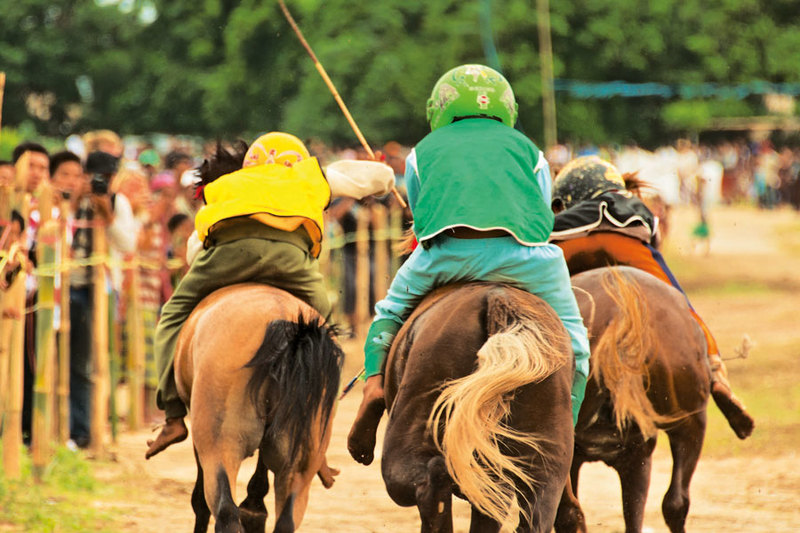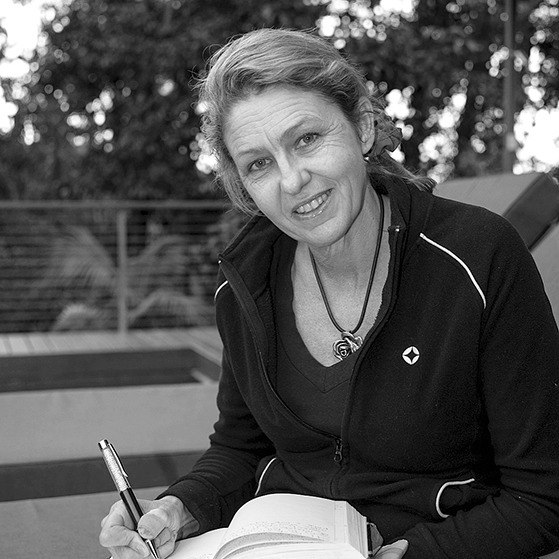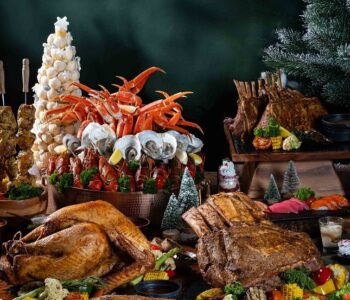Every year at the Bau Nyale Festival in Kuta, Lombok, jockeys come together to compete in a horse racing event unique to Indonesia. Jockeys are always light, but these jockeys are different. They are children who start their training when they are four or five years old. They are ready to compete in the horse racing circuit from the age of seven or eight.

As I stood at the horse stalls and watched these young jockeys preparing for the race of their life, I started chatting with Irwan. “I am seven years old now and will ride until I am ten or maybe eleven, when I get old and I get too big,” he said. “I love to race, and I really love my horse.”
Child jockeys ride without saddles and they don’t wear shoes but I was pleased to see Irwan strapping on a helmet. “My Dad will get the big prize money if I win," he said happily. “We could be going home with a cow or a motorbike.”
Irwan’s father, Herman, joined us and told me that child jockey events are held all around Lombok and there are competitions between West Lombok, North Lombok and Central Lombok, including his hometown, Praya.
Herman explained that a big inter-island race takes place every year in Bima on the neighboring island of Sumbawa as part of Indonesia’s 17 August Independence Day celebrations. The event is accompanied by an elaborate and colourful parade of specially adorned horses and jockeys. The kids have fun meeting riders from other islands, including Sumba, Lombok, Bali and Flores. They race for prize money and enjoy showcasing their skills, wit and speed.
The kids have fun meeting riders from other islands, including Sumba, Lombok, Bali and Flores. They race for prize money and enjoy showcasing their skills, wit and speed.
By then the excitement had started to build as the jockeys were being weighed-in and the starting stalls were being made ready. I moved to the edge of the 1200-meter dirt track circuit. Irwan and the other boys were already approaching the start, adjusting their woolen masks and settling down in preparation for the race.


Their horses, which were only about 1.20 meters (4 feet) high, were having their horseshoes checked before entering the stalls. There was a fair amount of heavy breathing, horse snorting and shoe shuffling going on as they were being prepared.
I saw Herman helping his son to mount his horse. He was giving Irwan advice to keep focused and encouraging him by praising his riding skills. Hopefully, he would ride to glory.
As the gates sprung open, the jockeys and their horses bolted forward. I watched Irwan clinging on for dear life. The crowd burst into roars of encouragement as the young jockeys took charge, using their whips with precision timing. Their skills were astounding. They seemed to be at one with their horses. Around the track they went at high speed and even a local dog joined in, racing for his life too.
I was part of a crowd of around 700 spectators who got swept up in the action, moving from point to point behind a thin rope surrounding the track to get a better look. The tension heightened as the horses steamed down the home straight, riders’ and horses’ eyes intent on the finish.
One horse suddenly faltered as it rounded the corner into the home stretch. The boy and horse fell together. Both were taken care of very quickly, with the only damage appearing to be to the boy’s emotional state. He was devastated. While there were no injuries this time, I am sure this is not always the case. As the riderless horse took off through the crowd causing a great kafuffle, the race finished. Irwan had come in second.

Herman told me, “Children are light and quick learners and that’s why they make great jockeys. My boy learned to ride from the age of five. If at any time he didn’t want to ride anymore, I would not force him, but he’s very keen and really loves to race."
I noticed a few rupiah notes exchanging hands in the crowd, probably bets on the next race. Gambling is, in essence, illegal but it is very much part of this racing tradition, and no one seemed too fussed.
- Praya, Central Lombok hosts races every Sunday from 10.00am to 12.00 noon.
- Kuta, Lombok hosts the annual Bau Nyale (sea worm) Festival, which features horse racing.
- Sumbawa Island hosts the annual Moyo Festival, including child jockey horse racing events.
I spoke with one of the organizing committee members who assured me, “These boys grow up with horses. They are extremely skillful riders. We have celebrated the end of the rice harvest season with child jockey horse races for many generations and as far as I know, so far no one has been seriously hurt or died.”
“I know this from my great grandfather, so it seems this tradition has been going on forever,” he continued. “We have eleven-day race meets in Bima on Sumbawa, and last year we attracted nearly 600 horses. The competitors come from the nearby islands of Sumba, Bali, Lombok and Flores to compete. The grand jockey prize last year was one million rupiah (USD 75.00) and for the group winners, the top prize was very sizeable – two cows per group race.”

The organizer went on to tell me that some children take two months off school for the various competitive events held during the horse race season. The good riders have the potential to earn 15 million rupiah (USD1100) depending on how many races they enter.
Praya, the capital of the Central Lombok Regency, was once the home of important royals from Lombok’s indigenous Sasak tribe. Sasak kings are known to have kept horses. Horse riding, racing and rituals remain an integral and colourful part of the island’s heritage. The child jockeys of Lombok are playing their part in keeping this heritage alive.
Lombok Tour Guide
Email: lomboklintrack@gmail.com
Facebook: lomboklintrack
Tel: +62 817 363 507
_______
This article is originally from paper. Read NOW!Jakarta Magazine March 2018 issue “Design for Living”. Available at selected bookstore or SUBSCRIBE here.







